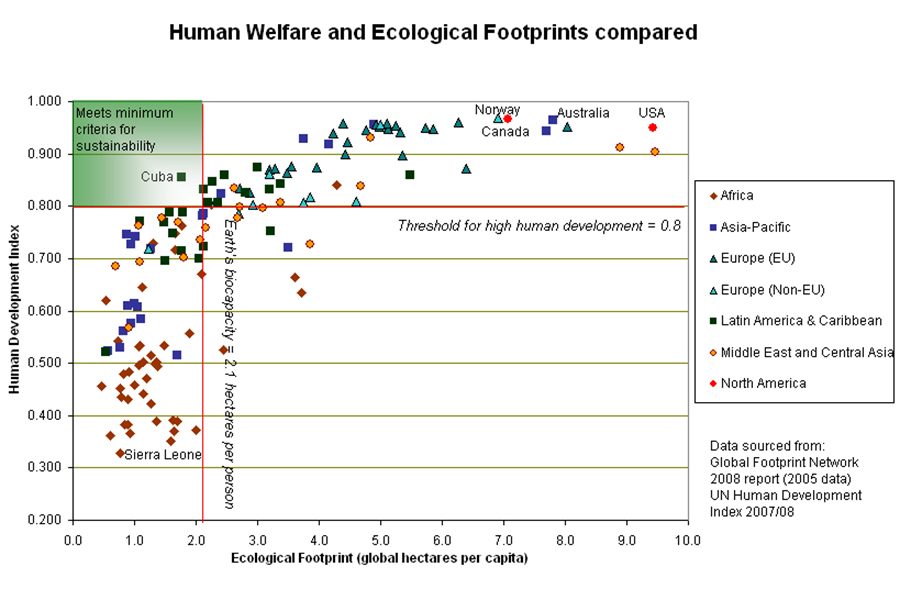Human Impact on Earth Continues to Grow
A new report by the World Wildlife Fund shows effects of human activity on Earth.
PHOTO | Wikimedia Commons
A chart demonstrating human’s ecological footprint and sustainability by country.
The World Wildlife Fund reports decreasing vertebrate animal populations, the Earth entering a new geographical epoch and human’s overuse of natural resources, according to WWF’s Living Planet Report 2016.
The Living Planet Index measures thousands of populations of mammals, birds, reptiles, amphibians and fish across the globe. The LPR included an updated global LPI which showed an average decline of all vertebrate populations by 58 percent between 1970 and 2012. WWF predicts that if the trend continues there will be a two-thirds decline by 2020. Within the different species monitored, freshwater animal’s LPI declined the most with a 81 percent decline in population abundance.
“I think one of the main contributors is animal agriculture, what we are eating and how we get it,” junior Stewardship Club member Morgan Hickman said. “We can’t create sustainability if the majority of the population continues to eat the way it eats.”
WWF also suggests that the Earth has transitioned from the geographical epoch Holocene into Anthropocene. Geographical epochs are defined by evidence in rock layers and have typically lasted around three million years, according to National Geographic. A dramatic increase in world population, fertilizer consumption, forest lost, freshwater use, marine animal consumption and rise in carbon dioxide in the air have caused the Anthropocene to come millions of years too early, according to LPR.
“Anthropocene means the ‘Age of Humans,’” Environmental Science teacher and Stewardship Club sponsor Amy Vandenbrul said. “The epoch was named this because of such a domination and large scale modification to the Earth by humans.”
WWF fund measures the human activity they suggest caused the new epoch in ecological footprint of consumption. The footprint compares human consumption of natural resources and the amount of biologically productive area required to provide resources and to absorb waste. Since 2012, 1.6 Earths have been needed to supply for human use of natural resources, according to LPR. The causes for this “overshoot” are habitat and species loss and an increased carbon pollution, according to LPR.
“Many scientists have said that we are in the middle of the sixth mass extinction,” Vandenbrul said. “This one is different than past extinctions though because it is being caused by humans.”
WWF warns that the Earth cannot sustain current human activity for long because consumption of its resources is happening faster than it is able to reproduce. The LPR proposes that sustainability and resilience for the Earth can be achieved by transitioning to a global economic system that works to preserve natural capital, create equitable resource governance, redirect financial flow away from destructive activities and most importantly transform energy and food systems.
“Even the people who are talking about it aren’t really doing anything,” junior Stewardship Club member Sarah Hogan said. “It’s easy to preach, we need to practice.”



